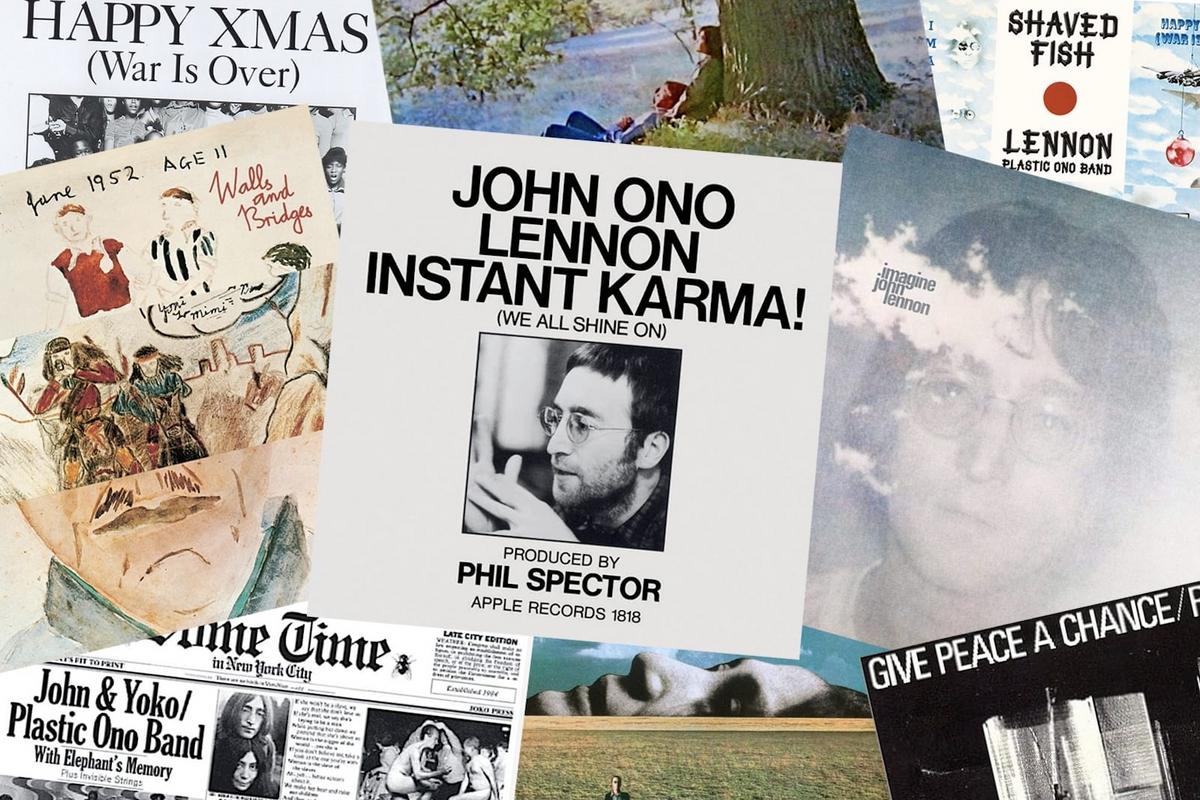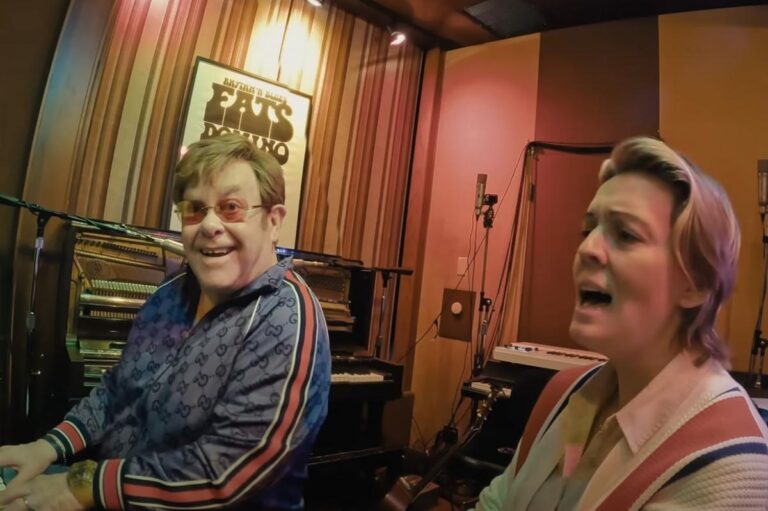John Lennon didn’t have the big-bang decade-opening album like his former bandmate George Harrison. He didn’t turn to more homespun music like Paul McCartney and Ringo Starr. Instead, he simply bared his soul on 1970’s Plastic Ono Band.
The LP became a Top 10 international hit and went gold. But more importantly, Plastic Ono Band set a template of frank honesty and sharp introspection that would guide Lennon throughout the ’70s.
He’d reach a commercial peak with Imagine, a more radio-friendly update of the Plastic Ono Band approach that became an international No. 1 smash. The 1970 Top 5 single “Instant Karma” gave Lennon an opportunity to look outward. But gold-selling Top 10 U.S. hits Mind Games and Walls and Bridges followed the same creative path as Imagine, revealing things about Lennon that were illuminative and cathartic.
READ MORE: 20 Beatles Songs That John Lennon Hated
In fact, as echoed in the following list of Top 25 John Lennon ’70s Songs, the only time he really stumbled was when he focused solely on current events and politics. No songs from 1972’s Some Time in New York City appear as part of this countdown. Also absent are tracks from 1975’s Rock ‘n’ Roll, but that’s only because the album was devoted to cover songs from Lennon’s youth.
That’s where things ended musically in the ’70s, as he memorably sat out the decade’s last years to help raise a child. But Lennon had already fashioned an impressive resume, especially when he avoided Voice of a Generation-style pretense in favor of simply speaking from the heart.
Angry outbursts like “I Found Out” and “Gimme Some Truth” were tempered with an orphan’s visceral dread of dishonesty and rejection. Flights of lyrical fancy like “Mind Games” and “#9 Dream” remained very much rooted in Lennon’s personal time and place. Even “Imagine,” his often-misunderstood paean to a utopian peace, has a decidedly personal admission of doubt buried in its platitudes: “You may say I’m a dreamer.”
That kind of frank, even brutal honesty about his hopes, his fears and his heart gave lasting resonance to music from the first decade after the Beatles split. Here’s a look back at the Top 25 John Lennon ’70s Songs:
No. 25. “Old Dirt Road”
From: Walls and Bridges (1974)
John Lennon’s Lost Weekend shenanigans with Harry Nilsson sometimes came to a very bad end. Even the album they produced together during this era, Nilsson’s Pussy Cats, has its share of questionable moments. Then there’s “Old Dirt Road.” Lennon didn’t think much of this Nilsson co-written deep cut, but it’s a delightful little reverie. Nilsson must’ve thought so, too: He recorded his version for 1980’s Flash Harry, the last studio LP released in Nilsson’s lifetime.
No. 24. “Power to the People”
From: Shaved Fish (1975)
“Power to the People” previewed the more political bent heard on Some Time in New York City – but took a different approach. Unlike the determinedly newsy songs that followed, Lennon crafted a huge, hooky chorus and leveraged a universal theme. Alan White’s doggedly aggressive rhythm moved everything along. Unfortunately, however, that theme was already a bit passe. Lennon later acknowledged that “Power to the People” probably arrived about a decade too late.
No. 23. “Surprise, Surprise (Sweet Bird of Paradox)”
From: Walls and Bridges (1974)
One of the first songs attempted for Walls and Bridges, “Surprise, Surprise (Sweet Bird of Paradox)” might find Lennon at his most carnal. It’s certainly Lennon in one of his happiest moments. Ironically, the earliest demos were dark ruminations, almost like a ’50s lost-love ballad. (Lennon later cited “Little Darlin'” by the Diamonds as an inspiration.) Now overcome with lusty desire, he makes an improvised vocal reference to the Beatles’ “Drive My Car” as “Surprise, Surprise (Sweet Bird of Paradox)” fades.
No. 22. “Working Class Hero”
From: Plastic Ono Band (1970)
With this Bob Dylan-esque three-chord call for a revolution in thought, Lennon’s sharply ironic asides (“if you want to be a hero well just follow me“) are often lost. It’s a shame because this populist message clearly meant a lot to Lennon, as he did hundreds of takes over several days at Abbey Road. Frustrated with the results, Lennon inserted the “tortured and scared you for 20-odd years” verse from a different take to complete “Working Class Hero.”
No. 21. “Going Down on Love”
From: Walls and Bridges (1974)
As with “Surprise, Surprise” from elsewhere on Walls and Bridges, “Going Down on Love” started out much differently. Early versions matched the gritty stripped-down honesty of 1970’s Plastic Ono Band. Then Lennon started adding parts, most notably a tough little horn section. A song that was once this bleak exploration of the drama surrounding his love life was transformed – in sound, anyway. A check of the lyric sheet confirms that a directionless Lennon was standing at the very edge of an emotional abyss.
No. 20. “Bless You”
From: Walls and Bridges (1974)
A long-awaited exhale on a sonically overstuffed album. Lennon, then in the midst of an affair but still heartbroken over Yoko Ono, probably needed one in real life, too. The result was a few minutes of introspection as Lennon returned to his estranged wife – though, at this point, only in dreams.
No. 19. “I Know (I Know)”
From: Mind Games (1973)
As Lennon’s relationship with Ono began to falter, he offered a mea culpa in song not unlike “How?” and “Jealous Guy” from Imagine. Curiously, he also might have been reaching out to someone else with whom he was estranged: Paul McCartney debuted his new band Wings with 1971’s Wild Life, and the track list included a song called “Some People Never Know.” The opening riff on “I Know (I Know)” also strongly resembles “I’ve Got a Feeling” from the Beatles’ last-released album, Let It Be.
No. 18. “Nobody Loves You (When You’re Down and Out)”
From: Walls and Bridges, (1974)
Exiled on the other side of the country from Yoko Ono, Lennon finally opened himself to the fear of isolation he once angrily confronted on Plastic Ono Band. But without the closed-fist bravado that marked Lennon’s recordings of five years before. Instead, he submits to the emotions sparked by endings.
No. 17. “Whatever Gets You Thru the Night”
From: Walls and Bridges (1974)
At this point, Lennon’s flinty solo career hadn’t yet produced a No. 1 single. He broke the spell with a song inspired by a cribbed phrase from TV – this time after channel surfing into a late-night evangelist. Lennon’s friend Elton John was so confident the song would hit that he made a now-famous bet that led Lennon to his last-ever concert performance.
No. 16. “How Do You Sleep?”
From: Imagine (1971)
Half of the Beatles took part in this savage assault on McCartney, as Lennon made biting references to “Yesterday,” Sgt. Pepper’s Lonely Hearts Club Band and McCartney’s solo hit “Another Day.” So, is “How Do You Sleep?” a low point in their very public post-split bickering? Or one of George Harrison’s coolest-ever turns on the slide? Answer: yes
No. 15. “God”
From: Plastic Ono Band (1970)
In the album’s most important statement, Lennon blithely pushed aside fallen idols – from Dylan to religion to his old band – flatly declaring that “the dream is over.” He was moving on: After naming and then discarding all of those earlier talismans, Lennon concluded with a quiet affirmation of his love for Ono.
No. 14. “Isolation”
From: Plastic Ono Band (1970)
“Isolation” is the flipside of “God,” as Lennon admits deep insecurity surrounding his new post-Beatles existence. At one point, everyone but Starr drops out, and his insistent cadence feels like it’s mimicking Lennon’s terrified arrhythmia.
No. 13. “Out the Blue”
From: Mind Games (1973)
Lennon provided a peek into the mounting panic that surrounded his fracturing relationship with Ono on this often-overlooked ballad: “I was born just to get to you. Anyway I survived, long enough to make you my wife.” He completed things with soaring strings that sounded like a sadder, more honest version of Phil Spector’s cloying arrangement for “The Long and Winding Road.”
No. 12. “Love”
From: Plastic Ono Band (1970)
Lennon deftly paints a mirror-image portrait of two lovers responding to one another, in one of his simplest, most touching lyrics. Interestingly, Phil Spector – not Lennon – plays the similarly elliptical piano part. “Love” actually started out as a guitar-based demo.
No. 11. “Happy Xmas (War Is Over)”
From: Shaved Fish (1975)
“Happy Xmas (War Is Over)” started out as the theme of a quixotic anti-war billboard campaign during the Vietnam era, then become an unlikely modern holiday standard. Oddly enough, it failed to chart upon release.
No. 10. “Oh My Love”
From: Imagine (1971)
Lennon takes a breath between excoriating empty-suited politicians and ex-bandmates to lay bare tender affections for Yoko Ono. “Oh My Love” was the only song on Imagine where she initially earned a co-songwriting credit, though Ono’s name was later added to the title track, too.
No. 9. “Mind Games”
From: Mind Games (1973)
What if “I Am the Walrus” had an anti-war thread running through it? You might just get the title track from Mind Games, as Lennon tosses off Lewis Carroll-ish references to “druid dudes” and “mind guerillas” while railing against the ongoing conflict in Vietnam. That careful balance of fantasy and message likely helped it into the U.S. Top 20.
No. 8. “How”
From: Imagine (1971)
A song that thematically wouldn’t have felt out of place on Plastic Ono Band, “How” revealed a similar depth of self-doubt and fear, but presented things – like much of the Imagine project – in a sleeker, more approachable way. That doesn’t mean it was boring: Lennon’s jolting syncopations smartly echo his own insecurities.
No. 7. “Jealous Guy”
From: Imagine (1971)
“Jealous Guy” eventually became one of the most covered of Lennon’s solo tracks, with more than 100 reinterpretations — most notably by Roxy Music, whose update became a huge U.K. hit after Lennon’s murder. And yet this song still completely belongs to its author. Lennon creates this incredibly atmospheric music bed then sings with an unmatched fragility.
No. 6. “Imagine”
From: Imagine (1971)
Lennon himself actually nailed it: This song is “anti-religious, anti-nationalistic, anti-conventional, anti-capitalistic – but because it is sugarcoated, it is accepted.”
No. 5. “Mother”
From: Plastic Ono Band (1970)
Lennon switched from guitar to piano as he worked out this tortured wail for his missing parents, with Starr providing a smartly economical and fill-free rhythm that only added to the lyric’s stabbing emotion. Lennon recorded the shredding finale in single-line takes to save his voice. His pain is simply excruciating.
No. 4. “Gimme Some Truth”
From: Imagine (1971)
Originally demoed during the sessions that produced Let It Be, “Gimme Some Truth” melds Lennon’s love of witty banter with a knack for the devastating take down. As he rails against the hypocrisy and villainy of the day, Harrison can be found brutally sawing on his guitar.
No. 3. “Instant Karma”
From: Shaved Fish (1975)
This appropriately named tune, Lennon’s third solo single, was recorded at Abbey Road Studios the same day it was written. “Instant Karma” didn’t, as hoped, hit the shelves at record stores within 24 hours of completion — but it did arrive just 10 days later.
No. 2. “I Found Out”
From: Plastic Ono Band (1970)
Lennon unleashes a series of kill shots aimed at politicians, drugs, religion (“from Jesus to Paul“), parents, society – you name it – and Starr’s rugged cadence boldly echoes every rebuke.
No. 1. “#9 Dream”
From: Walls and Bridges (1974)
Lennon rarely looked back, which made a return to the sound of his 1967 creative apex with the Beatles as surprising as it was welcome. The narcoleptic mysticism of “#9 Dream” – Lennon said “ah bowakawa pousse, pousse” actually came to him in a dream – would have fit right in on Sgt. Pepper’s Lonely Hearts Club Band or Magical Mystery Tour. But it didn’t start out that way: Lennon’s original demo – simply titled “So Long” – was based on a contemporary string arrangement he’d written for Harry Nilsson’s cover of “Many Rivers to Cross” from 1974’s Pussy Cats.
Beatles Live Albums Ranked
Beatles live albums didn’t really used to be a thing – then they started arriving in bunches. Let’s count them down.
Gallery Credit: Nick DeRiso
How an Old Beatles Song Connected David Bowie With John Lennon




Leave a Comment